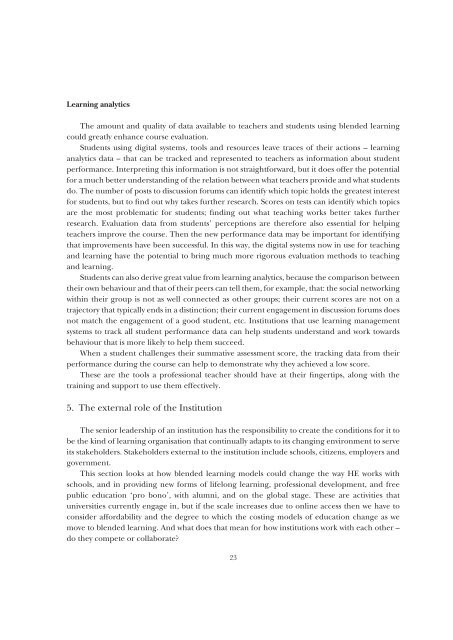Dillenbourg Higher education in the digital era
tw_blended-learning_en
tw_blended-learning_en
Create successful ePaper yourself
Turn your PDF publications into a flip-book with our unique Google optimized e-Paper software.
Int<strong>era</strong>ction with schools<br />
As we talked to universities <strong>in</strong> Flanders one repeated current issue was <strong>the</strong> transition from<br />
school to university. Students arrive unprepared for <strong>the</strong> level of work and <strong>the</strong> rigours of<br />
<strong>in</strong>dependent study. There is high bandwidth connectivity between schools and universities now,<br />
and <strong>the</strong> imag<strong>in</strong>ation of <strong>the</strong> teachers and students can be used to build <strong>the</strong> bridges that will<br />
improve student read<strong>in</strong>ess.<br />
One example is to redesign subsets of onl<strong>in</strong>e courses and resources as ‘taster’ courses for<br />
school students, <strong>in</strong> any subject area, and especially those who are not taught at school. Universities<br />
will use <strong>the</strong>se techniques to showcase <strong>the</strong>ir top lecturers and specialist courses, but could also<br />
coop<strong>era</strong>te to enhance applicants’ capacity for high-level <strong>in</strong>dependent learn<strong>in</strong>g, which all<br />
universities need.<br />
O<strong>the</strong>r ideas <strong>in</strong>volve school learners <strong>in</strong> <strong>the</strong> work of university students, e.g. as recipients of<br />
student project presentations to test <strong>the</strong>ir communication skills, or as assistants <strong>in</strong> collect<strong>in</strong>g data<br />
for science projects.<br />
Teacher professional development is devolv<strong>in</strong>g much more responsibility to schools, so <strong>the</strong><br />
ideas and <strong>in</strong>formation can go both ways. One example of <strong>the</strong> co-production of knowledge <strong>in</strong> an<br />
onl<strong>in</strong>e course is where academics supply <strong>the</strong> formal knowledge and tra<strong>in</strong>ee teachers supply <strong>the</strong><br />
evidence and reality of <strong>the</strong> application of <strong>the</strong>ory <strong>in</strong> practice. The same idea could be used with<br />
<strong>the</strong> many university students who could contribute <strong>the</strong>ir experience to <strong>the</strong> wider understand<strong>in</strong>g<br />
of tak<strong>in</strong>g <strong>the</strong>ory <strong>in</strong>to practice.<br />
Open and Distance Learn<strong>in</strong>g and Lifelong Learn<strong>in</strong>g<br />
The new production of knowledge, foreseen by Michael Gibbons and colleagues <strong>in</strong> <strong>the</strong> 90s,<br />
recognises both <strong>the</strong> formal, codified knowledge of <strong>the</strong> traditional discipl<strong>in</strong>es, and <strong>the</strong> <strong>in</strong>formal,<br />
implicit knowledge created by communities of practice (Gibbons et al., 1994). Our onl<strong>in</strong>e courses<br />
can now bridge <strong>the</strong> two. They provide access to <strong>the</strong> formal knowledge, but can also develop those<br />
communities of practice, where mature students, teachers, and work<strong>in</strong>g professionals share <strong>the</strong>ir<br />
experience of <strong>the</strong>ory <strong>in</strong> practice, of tak<strong>in</strong>g <strong>the</strong> formal <strong>in</strong>to <strong>the</strong> workplace and test<strong>in</strong>g it <strong>the</strong>re.<br />
Teach<strong>in</strong>g <strong>in</strong> this context is noth<strong>in</strong>g like <strong>the</strong> traditional idea of transmission or delivery, but is a<br />
<strong>the</strong>ory-<strong>in</strong>formed dialogue about practice that <strong>in</strong> turn co-produces a collective understand<strong>in</strong>g.<br />
With open access to such courses, why should undergraduates not be engaged <strong>in</strong> those same<br />
communities?<br />
Graduates and academics alike are aware of <strong>the</strong> rapid developments <strong>in</strong> <strong>the</strong> production of<br />
knowledge, fostered by <strong>the</strong> immediacy and universality of onl<strong>in</strong>e communications. Lifelong<br />
learn<strong>in</strong>g is now essential for every employee and citizen, if <strong>the</strong>y are to ma<strong>in</strong>ta<strong>in</strong> <strong>the</strong>ir capacity to<br />
contribute. Open onl<strong>in</strong>e courses will <strong>the</strong>refore <strong>in</strong>crease <strong>in</strong> importance and value to every<br />
<strong>in</strong>dividual. Universities should be plann<strong>in</strong>g to respond to this <strong>in</strong>creas<strong>in</strong>g demand, whe<strong>the</strong>r it<br />
is <strong>the</strong>ir ma<strong>in</strong> focus, as for <strong>the</strong> open universities, or is a by-product of <strong>the</strong>ir campus-based<br />
undergraduate and post-graduate courses.<br />
24


